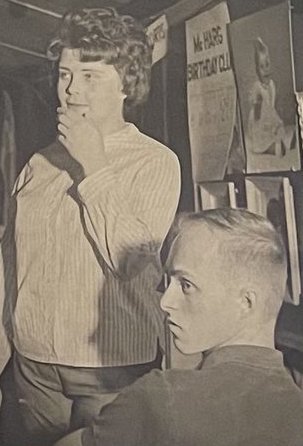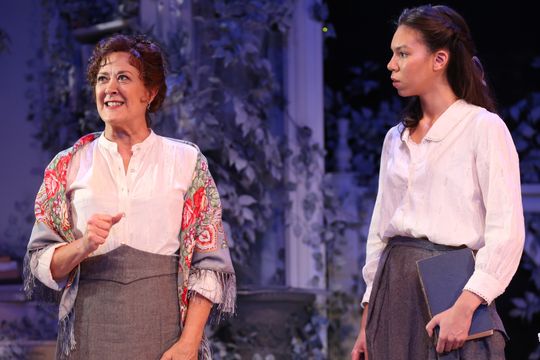Forgive my absence from the blog this week—I was, as Patrick O’Brian would say, overpressed with sail, and I needed some time to myself to get caught up. I’m now ready at last to resume regular postings.
Longtime readers of “About Last Night” will remember my friend Laura Demanski, who used to co-blog with me under the pseudonym “Our Girl in Chicago” once upon a time. Laura and I are still the closest of friends, and I’ve been mourning the recent death of her mother Lucile, about whom you can read more here. Laura wrote her obituary, and did so with elegant simplicity. My heart goes out to Laura, and to Greg Demanski, her father. It is, as I know all too well, a devastating thing to lose either a parent or a spouse. May your thoughts be with Laura and Greg in their time of trial.Watering a dry soul
* * *
Turning a perfect movie into a stage musical is almost always a fool’s game. The only way the results are guaranteed to work is if you add a perfect score, as Stephen Sondheim did with “A Little Night Music” and David Yazbek did with “The Band’s Visit.” Otherwise, the resulting show rarely makes an impression sufficiently strong enough to be memorable in its own right.
“The Visitor,” the Public Theater’s new stage version of Tom McCarthy’s poignant 2007 film about a depressed widower whose parched soul is refreshed by an unexpected encounter with three illegal immigrants, doesn’t quite fill the bill: The score, by Tom Kitt and Brian Yorkey, is no better than fair. But the show works anyway, both because the book, by Mr. Yorkey and Kwame Kwei-Armah, is so faithful to Mr. McCarthy’s original screenplay and because the production, directed by Daniel Sullivan and starring David Hyde Pierce, is superlative. Everything good about the film is reproduced on stage so precisely that the comparative weakness of the score largely ceases to be an issue….
* * *
Read the whole thing here.Replay: Thomas Beecham conducts Delius
Almanac: Thomas Beecham on the nature of music
“The whole point of music is that it should sound well. Never mind what it signifies. Music should have wings and float and give delight.”
Thomas Beecham, in conversation with Neville Cardus
In praise of working girls
* * *
Time was when George Bernard Shaw’s effervescent comedies of ideas were seen on Broadway with fair regularity, but those days are long past. All the more reason, then, to praise David Staller, the artistic director of Project Shaw, a long-running series of semi-staged concert readings of the playwright’s 60-odd shows. In addition to Project Shaw, Mr. Staller’s Gingold Theatrical Group presented fully staged small-scale off-Broadway versions of “Heartbreak House” in 2018 and “Caesar and Cleopatra” in 2019, and now they’re doing “Mrs. Warren’s Profession,” which hasn’t been seen anywhere in New York since the Roundabout Theatre Company mounted it 11 years ago. The production is completely satisfying, and the play gains immeasurably from up-close presentation (it is being performed in one of Theatre Row’s six 88-seat houses).
Mrs. Warren’s “profession,” which could only be alluded to by stealth and with carefully chosen synonyms when Shaw wrote the play in 1893, is prostitution….
The Roundabout Theatre Company is putting on a jumbo remount of the Michael Longhurst-directed West End revival of “Caroline, or Change,” the 2004 Tony Kushner-Jeanine Tesori musical about an angry, frustrated Louisiana maid (played with magnetic authority by Sharon D Clarke) and the eight-year-old Jewish boy who adores her. Set in 1963, right around the time of the Kennedy assassination, the semi-autobiographical “Caroline, or Change” portrays an inflection point in the civil-rights movement in a style not far removed from magic realism (Caroline’s washer and dryer both sing).
“Caroline, or Change” is one of the most widely admired musicals of the current century. I didn’t share that view when it was new, though, and haven’t changed my mind 17 years later….
* * *
Read the whole thing here and here.Almanac: Bernard Shaw on vulgar rulers
“Vulgarity in a king flatters the majority of a nation.”
George Bernard Shaw, Maxims for Revolutionists
Almanac: Shaw on secrets
“There are no secrets better kept than the secrets everybody guesses.”
George Bernard Shaw, Mrs. Warren’s Profession





